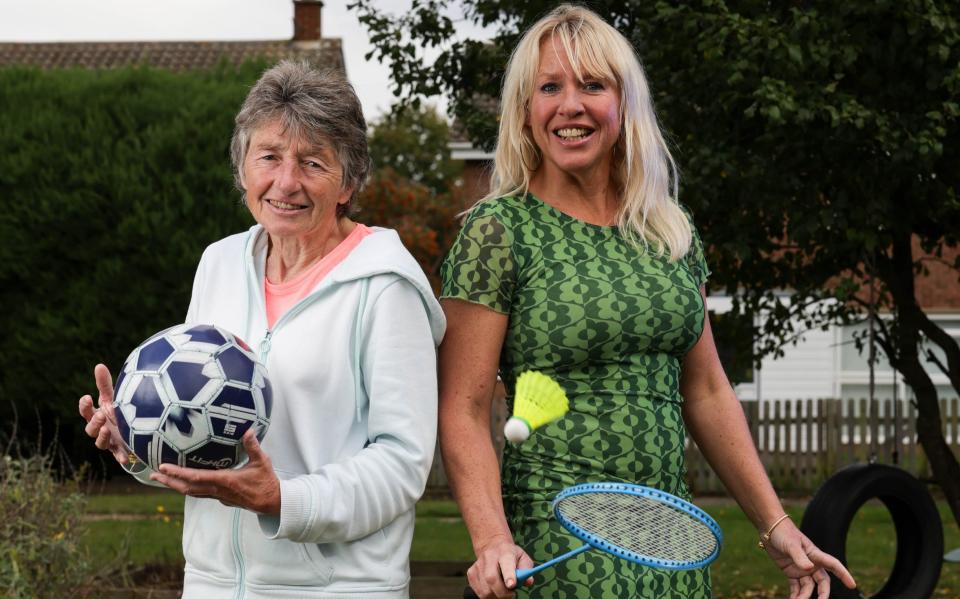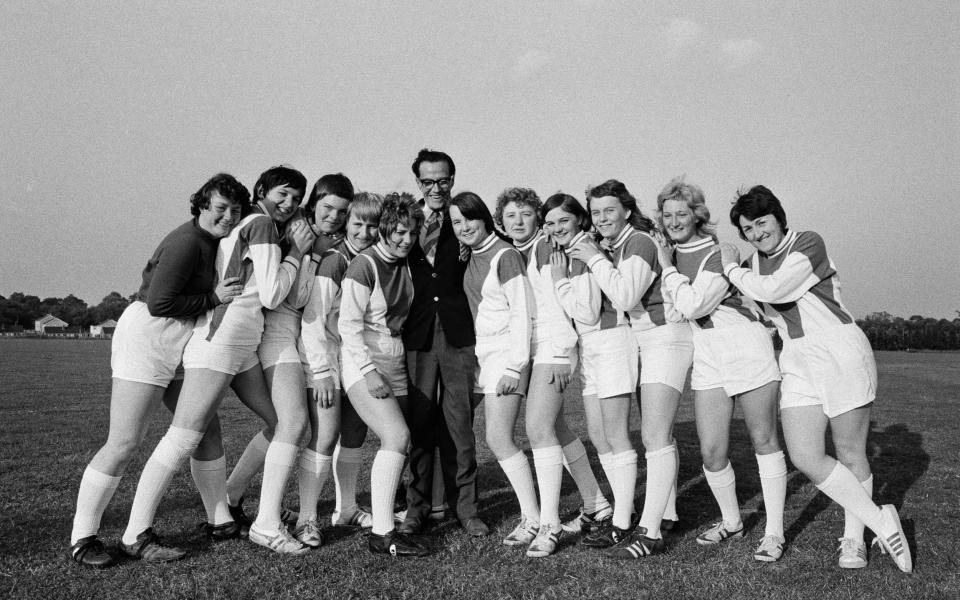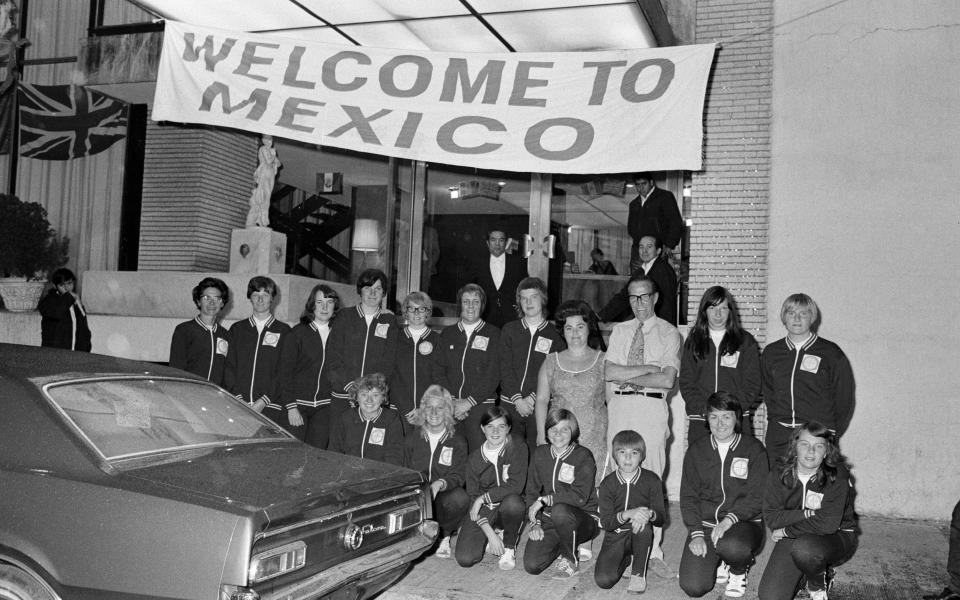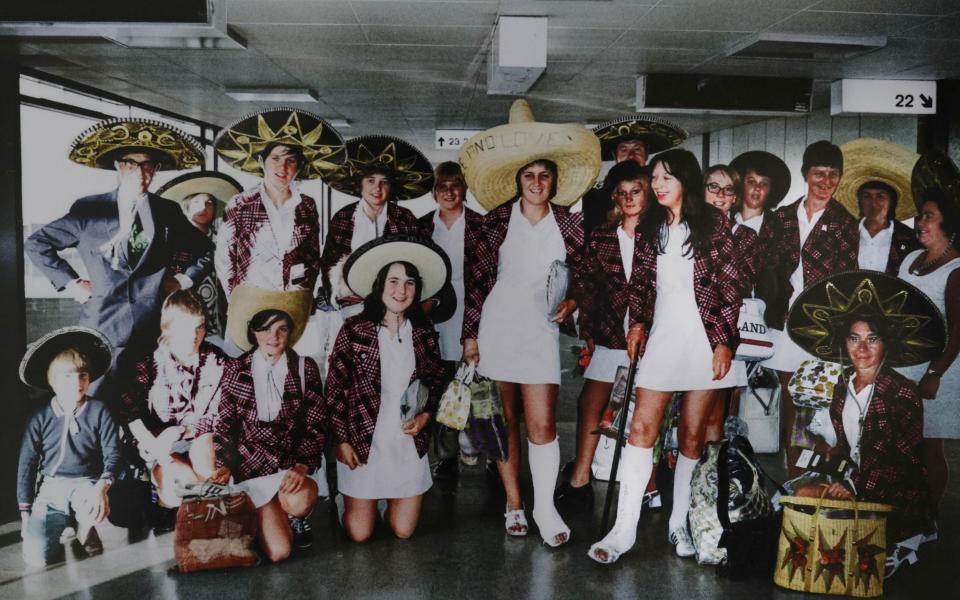‘Lost Lionesses’: How a group of young women, snubbed by the FA, made it to the 1971 World Cup

Gail Emms, who won a silver medal in badminton at the Athens Olympics, has just written a book about one of the most intriguing forgotten moments in English sport. Called “The Lost Lionesses”, it tells the story of the team who represented their country in the first Women’s World Cup in 1971.
Emms admits that when it came to research, she had a bit of a head start: her mother Jan was one of the England players.
“When I was growing up, I loved reading mum’s scrapbook of the tournament,” Emms tells Telegraph Sport, as she sits in her mother’s house in Bedford. “I didn’t realise the rest of the country knew nothing about it. I remember when I was at primary school volunteering to do a show and tell on how my mum had played for England in the World Cup. And the teacher saying to me afterwards: ‘Gail, don’t make things up’.”
Mind, the teacher had a point: it is the most unlikely yarn. As her book reveals, it is a story of vindictive intransigence, of absurd misogyny, of battling against the odds. And of vast crowds filling stadiums in Mexico, of a group of young English women being feted wherever they played, then being forgotten the moment they returned home.
“Nobody could believe what we did and I’m not sure we did,” recalls Jan, as she makes her visitors a cup of tea. “It was almost surreal.”
‘The blokes in blazers thought we should all be in the kitchen’
Back in the 1960s when the young Janice Barton was growing up in Bedford, football was determinedly not a game for girls. A countrywide ban on women playing on Football Association-affiliated pitches was still in force. The young Jan, though, loved the game and played all the time, on the street with her brothers and local lads.
“I just played kickabout, nothing formal,” she recalls. “But then you couldn’t, there were no girls’ teams. Though Gill [Sayell], our right winger in Mexico, her mother cut her hair short back and sides to make her look like a boy and she played for boys’ teams. She called herself Billy. She actually had scouts coming to watch her saying ‘we want to sign that lad’. They had a bit of a shock when her mum said ‘that’s my daughter’.”
When Jan was about 17, she was spotted in a street kickabout by a local businessman called Harry Batt, who invited her to play for his team: Chiltern Valley Ladies. Batt was a man ahead of his time. He saw women’s football as a huge potential growth area and was keen to exploit it financially. Not that many others shared his vision.
“There were pockets of women’s football round the country, usually where some enterprising dad had started things so his daughter could play,” says Gail. “There was a team in Nuneaton and one in Birmingham. There were no leagues or cups. So games were few and far between.”
But when Batt heard that a putative Women’s World Cup was being planned, he got himself an invite from the organisers.
“He went to the FA and tried to get their backing,” says Jan. “He told them he had sponsorship, that it wouldn’t cost them anything, that there would be loads of prestige in it for them. But they gave him short shrift, the blokes in blazers weren’t interested in women’s football. They thought we should all be in the kitchen.”

Batt decided to go ahead anyway. He collected a team together, largely consisting of his Chiltern Valley players, and took them to a qualifying tournament in Sicily.
“I’d never been abroad before,” Jan recalls. “My dad had to drive me to Peterborough to get a passport.”
Incredibly, despite their lack of big-game experience, the English women qualified for the finals, which were to be staged on the other side of the world, in Mexico. For the players, lured by the prospect, there was just one problem: getting time off work.
“I was working at the TSB at the time,” Jan says. “And when I said to my manager, could I have some time off to go play football in Mexico, he looked at me as if I was mad. Not a chance. So I gave in my notice. No way was I missing out.”
Batt’s problem was many of his original squad were less keen to throw in their jobs. So, in order to make up the numbers, he picked several young girls who could come in the school holidays. The 14 who flew out to Mexico were thus incredibly young; at 19, Jan was the third oldest. So young were they, they were unable to partake of the product of the tournament sponsors, Martini. Not that it mattered: the facilities the company paid for were first class; indeed one of the squad told Gail she has bought a bottle of Martini every Christmas since just to say thank you for what they provided.
“We had buses with police escorts, we had wonderful food, we stayed in the same hotel in Mexico City the England [men’s] team had done at the World Cup the previous year,” recalls Jan. “One of the girls found out from the staff she was in the room Bobby Charlton had been in. I never found out who’d been in my room. Knowing my luck, it was probably Peter Bonetti.”

Because of the FA’s refusal to sanction their trip, instead of England, they were obliged to call themselves the British Independents. Though everyone in Mexico referred to them as England. Or, as they quickly became dubbed by the Mexican press, “Las Chicas de Carnaby Street”. The other five teams in the competition were from Argentina, the Netherlands, Denmark, Italy and the hosts.
Hugely inexperienced, the English found themselves outflanked in their first group game against Argentina at the enormous Azteca Stadium.
“None of us had a clue what to expect,” says Jan. “And the Argentinians were absolutely filthy, fouling us left, right and centre. Two of our players broke a leg that game.”
But it was the match against the hosts, again at the Azteca, where the World Cup final had been staged, that Jan says took her breath away. If the first game attracting around 25,000 people was daunting, this was another level.
“We were used to playing in front of one man and a dog, and the man was usually shouting ‘get your t--- out’ at us. And here we were playing in front of 90,000 people. Walking out on to that pitch, hearing the noise, seeing the size of that crowd, will live with me for ever.”
The team lost 4-0, not surprising given the Argentina game had taken place the previous day.
Mexico went on to lose in the final against Denmark in front of a crowd of 114,000, which still counts as the largest ever to watch a women’s match. Evicted at the group stage, the British Independents played a fifth-place play-off against France and lost that, too. Jan, though, scored twice.
“Not many English players have scored in the Azteca,” she says. “And because I got two, I’m second on the list behind Gary Lineker who got three there in 1986.”
For all of them, it was an experience. They went home loaded with souvenirs (Jan wore a giant sombrero on the plane). Not that anyone noticed. Apart from a small piece in the local paper, the media ignored them. Though the following year, perhaps spurred into action, the FA did sanction the first ever official England women’s international, against Scotland. Jan and her team-mates, however, were not involved.
“Because we were Harry Batt’s girls, none of us were even invited to trial for the team,” she says. “That still rankles. And they banned Harry for life from any involvement in football. Poor chap, it broke him.”

A couple of the squad continued in the game (Sayell played for Arsenal Ladies). But most gave up. And soon their exploits were erased from the collective memory. Jan does not even have her medal anymore: it was stolen when the team held a reunion in a pub.
Then, just before the 2018 World Cup, Christine Lockwood, one of their number, rang Danny Baker on his Radio Five Live show. “He’d asked who, if not England, people wanted to win the competition. And Chris just rang in, got on air and said Mexico. He asked why and she said, ‘because they were so nice to us when we played there in the first Women’s World Cup’. He said: ‘hang on, I know everything about football and I have never heard of it’. He made a real song and dance, took her number, called back and made a whole programme about it.”
From there, there was a piece on the One Show, a film called Copa 71 produced by the Williams sisters, and now comes Gail’s book. Fifty-three years on, finally there is recognition of their place in history.
“I did like it when [England manager] Sarina Wiegman said recently she wanted to thank the 1971 team because they were the pioneers, and that without them we’d never have got what we have with the women’s game. That was a really nice touch,” says Gail.
And for Jan, who cheered from the sidelines as her daughter became one of the best badminton players in the world, there has been the delight of rediscovering her football touch with Gail’s two sons.
“When they come round, we have a little game, whoever can chip the ball through that top window. I love it, playing with them.”
And does she want to win? “Oh yes,” she grins.
The Lost Lionesses by Gail Emms is published by Headline, and is available now.

